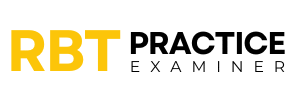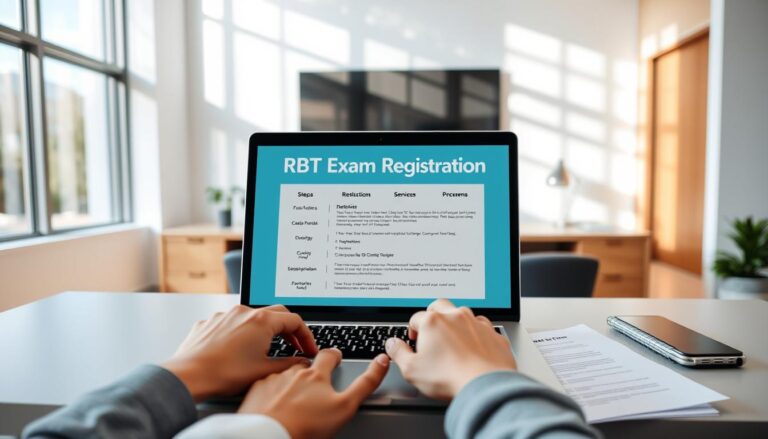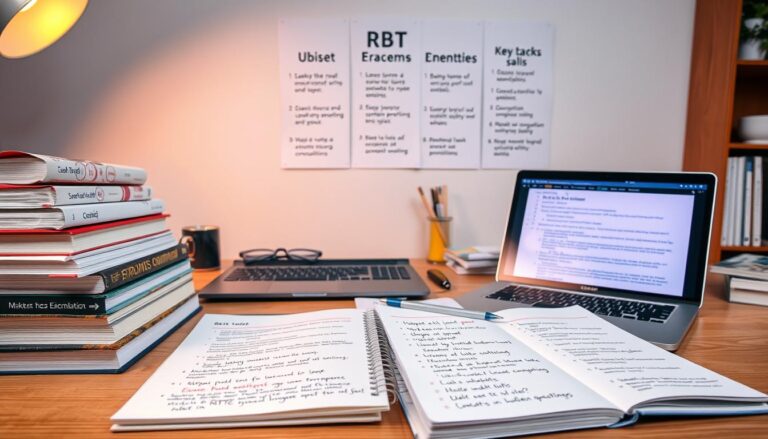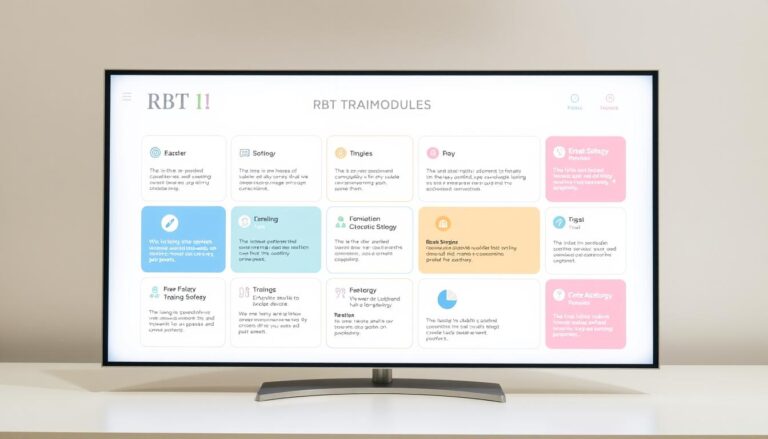Is an RBT a Therapist? Understanding the Role of a Registered Behavior
In the field of behavioral health, many wonder about the role of a Registered Behavior Technician (RBT). The question “Is an RBT a therapist?” often comes up. This is true for healthcare students and those looking into careers in behavioral support services.
An RBT is not a licensed therapist but a key support professional in behavioral intervention. They work directly with clients under the supervision of Board Certified Behavior Analysts (BCBAs). This makes them vital in implementing behavior intervention strategies.
Registered behavior technicians offer important hands-on support in places like schools, clinics, and home-based programs. Their training lets them work closely with individuals, mainly those with autism spectrum disorders. They help implement structured behavioral strategies.
To understand the role of an RBT, we need to look at their responsibilities, training, and professional boundaries. This guide will explain the key aspects of being a registered behavior technician. It will also clarify the differences between RBTs and licensed therapists.
Understanding the Core Difference: Is an RBT a Therapist?
Behavioral therapy has a complex professional landscape. Many ask: is an RBT a therapist? The answer is no. A Registered Behavior Technician (RBT) is a key support in therapy but is not a licensed therapist.
RBTs work under a Board Certified Behavior Analyst (BCBA). They carry out specific behavioral therapy steps. They are vital but don’t have the freedom of licensed therapists.
- RBTs provide direct client support
- They follow treatment plans designed by certified analysts
- Cannot independently diagnose or create treatment strategies
In therapy settings, RBTs are trained to carry out detailed plans. Their main tasks include:
- Collecting data on client progress
- Implementing behavior modification techniques
- Supporting clients in developing new skills
The main difference is in their scope of practice. Licensed therapists can make treatment plans, diagnose, and work alone. RBTs, on the other hand, are key in executing these plans with care and commitment.
Therapy services need teamwork, and RBTs are a big part of that team in behavioral health support.
Defining the Role of a Registered Behavior Technician
A registered behavior technician (RBT) is key in providing special behavioral therapy. They work directly with people, using strategies to help them change their behavior for the better.
RBTs are vital in behavioral therapy. They work under Board Certified Behavior Analysts (BCBAs). Their main job is to give direct care and follow treatment plans for those with developmental and behavioral issues.
Key Responsibilities in Behavioral Support
The main duties of a registered behavior technician include:
- Implementing behavior intervention plans
- Collecting and recording client behavioral data
- Assisting clients in developing social and communication skills
- Supporting skill acquisition and behavior reduction strategies
Daily Tasks and Duties
Every day, an RBT works closely with clients. They do things like:
- Conducting one-on-one therapy sessions
- Documenting client progress
- Collaborating with supervisory analysts
- Modifying intervention strategies as needed
Working Environment and Settings
Registered behavior technicians work in many places, such as:
- Schools – Supporting students with special needs
- Clinical settings – Providing structured behavioral therapy
- Home-based services – Delivering personalized interventions
- Community centers – Facilitating group and individual programs
These professionals are key in helping people learn important life skills and manage their behavior. They do this through specific behavioral therapy methods.
Educational Requirements for RBT Certification
To become a registered behavior technician, you need specific education. This education is key for a career in behavioral therapy. Unlike other therapy certifications, RBT requires focused training and certain qualifications.
The minimum education needed for an RBT includes:
- High school diploma or equivalent
- Minimum age of 18 years old
- Passing a background check
- Completion of a 40-hour training program
Aspiring RBTs must take in-depth training. This training covers essential behavioral intervention techniques. It usually includes:
- Foundational coursework in applied behavior analysis (ABA)
- Supervised practical training
- Ethics and professional conduct modules
- Client interaction and communication skills
The Behavior Analyst Certification Board (BACB) sets strict educational standards for RBTs. Candidates must show they understand behavioral principles, data collection, and intervention strategies. While a bachelor’s degree is not needed, the training is very thorough. It prepares RBTs for their important role in behavioral health services.
It’s important for RBTs to keep learning. They must stay updated with ongoing training and supervision. This ensures they keep up with the highest standards in behavioral intervention.
The Certification Process and Training for RBTs
Becoming a registered behavior technician (RBT) is a journey of training, exams, and growth. It makes sure professionals are top-notch in behavioral support and therapy.
Those wanting to be RBTs face a detailed path to get their credentials. It takes hard work, special training, and a dedication to excellence in behavioral health.
Required Training Hours
To get certified, RBT hopefuls must finish certain training:
- 40 hours of approved training program
- Curriculum covering applied behavior analysis principles
- Direct supervision from a Board Certified Behavior Analyst (BCBA)
Examination Process
After finishing their training, candidates must pass a big exam. It checks their:
- Knowledge of behavioral intervention techniques
- Understanding of ethical guidelines
- Practical application of behavioral support strategies
Maintaining Certification
RBTs must keep showing they’re good at their job by:
- Annual renewal requirements
- Ongoing supervision
- Periodic competency assessments
- Continued professional development
Keeping certifications means RBTs must keep up with new practices and standards. This ensures top-notch support for people and communities.
Comparing RBTs and Licensed Therapists
It’s important to know the difference between a Registered Behavior Technician (RBT) and a licensed therapist. Both are key in helping people, but they have different jobs and skills. Their roles and what they can do are quite different.
An RBT is not the same as a therapist. They work with a Board Certified Behavior Analyst (BCBA) and focus on specific tasks. They don’t have the same education or power to give therapy like licensed therapists do.
| Characteristic | Registered Behavior Technician (RBT) | Licensed Therapist |
|---|---|---|
| Education Requirements | High school diploma, 40-hour training | Master’s or doctoral degree |
| Certification Level | Paraprofessional certification | State-licensed professional |
| Supervision | Requires direct BCBA supervision | Independent practice |
| Therapy Provider Status | Support role | Primary service provider |
Licensed therapists have more training. They can:
- Diagnose mental health conditions
- Develop detailed treatment plans
- Give independent psychological help
RBTs, on the other hand, help by following plans made by their BCBA. Their job is very important but focused. They help clients directly but work within set rules.
Even though RBTs are not therapists, they are vital in the team. Their training lets them offer specific help with guidance. They are important in certain situations.
Scope of Practice: What RBTs Can and Cannot Do
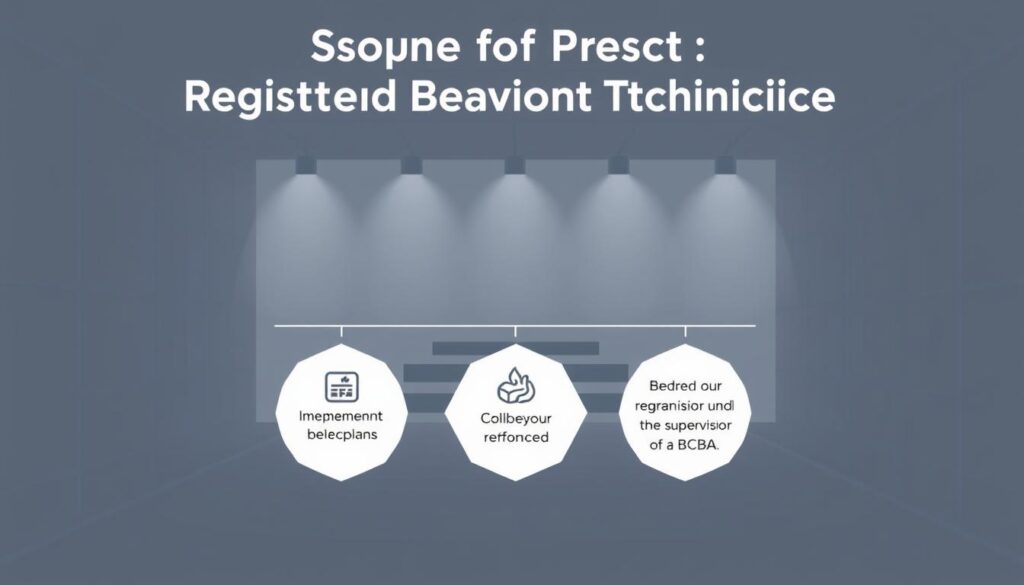
Registered Behavior Technicians (RBTs) are key in behavioral therapy. But, they have clear limits and rules to follow. Knowing these helps ensure therapy is both effective and ethical for clients.
RBTs work within a set framework. This defines their duties and what they can do in counseling services. Their role is designed to offer top-notch support while keeping professional lines clear.
Legal Limitations in Behavioral Therapy
RBTs face strict legal rules to protect everyone involved. These rules include:
- Cannot diagnose mental health conditions
- Limited to implementing behavior intervention plans
- Must work directly under BCBA supervision
- Cannot develop independent treatment strategies
Professional Boundaries
Keeping professional boundaries is vital in behavioral therapy. RBTs must:
- Maintain strict confidentiality
- Avoid personal relationships with clients
- Document interactions objectively
- Communicate exclusively through appropriate channels
Supervision Requirements
Supervision is a key part of an RBT’s job. Board Certified Behavior Analysts (BCBAs) oversee them closely. This ensures quality and follows professional standards in therapy.
Supervision includes regular meetings, reviews, and training. It helps RBTs stay at the top of their game in behavioral therapy.
Working Under BCBA Supervision: The Hierarchical Structure
In the world of behavioral therapy, Registered Behavior Technicians (RBTs) work under a strict supervision system. The Board Certified Behavior Analyst (BCBA) is key, guiding and overseeing the RBT’s work.
The supervision structure in behavioral therapy aims for top-notch care and upholds professional standards. RBTs are directly supervised by a BCBA. This BCBA offers ongoing support, direction, and checks on their work.
- Direct supervision involves regular face-to-face meetings
- BCBAs review treatment plans and progress
- Continuous monitoring of RBT performance is standard practice
Supervision includes critical components for effective therapy:
- Weekly case review sessions
- Performance feedback
- Treatment strategy refinement
- Professional skill development
The hierarchical structure safeguards both clients and professionals. BCBAs create detailed treatment plans. RBTs carry out these plans with the BCBA’s close supervision. This ensures therapy meets the highest care and ethical standards.
Career Advancement Opportunities for RBTs
Registered Behavior Technicians (RBTs) have exciting career paths in mental health treatment. The field of behavioral therapy offers many ways to grow and get more certifications.
RBTs can plan their career by looking at different paths. These paths can improve their skills and make them more valuable in behavioral health services.
Professional Development Paths
- Pursue advanced therapy certifications
- Transition to Board Certified Behavior Analyst (BCBA) role
- Specialize in specific client populations
- Develop expertise in specialized intervention techniques
Additional Certifications to Enhance Career
| Certification | Focus Area | Career Impact |
|---|---|---|
| Autism Spectrum Disorder Specialist | Specialized Intervention | Higher Expertise |
| Advanced Behavioral Intervention | Complex Behavioral Strategies | Increased Marketability |
| Child Development Certification | Pediatric Behavioral Health | Broader Practice Scope |
Specialization Options
RBTs can explore special areas in mental health treatment that match their interests. Strategic specialization can open up rewarding career paths and boost job satisfaction.
- Developmental Disabilities Support
- Early Intervention Programs
- School-Based Behavioral Services
- Cognitive Behavioral Interventions
By always improving their skills and getting specific certifications, RBTs can build fulfilling careers in behavioral health services.
The Impact of RBTs in Behavioral Health Services

Registered Behavior Technicians (RBTs) are key in behavioral therapy and mental health treatment. They bring specialized skills that make treatment programs more effective in many healthcare settings.
RBTs contribute to mental health treatment in many ways:
- They directly support clients and intervene when needed.
- They create personalized behavioral strategies for each client.
- They collect and analyze important behavioral data.
- They help achieve overall treatment goals.
In mental health treatment, RBTs work closely with Board Certified Behavior Analysts (BCBAs). Together, they create meaningful interventions for clients.
The role of RBTs goes beyond helping individual clients. They also help achieve broader healthcare goals by:
- Reducing treatment costs with efficient strategies.
- Improving tracking of client progress.
- Enhancing communication among treatment teams.
- Providing consistent, structured support.
Studies show that behavioral therapy led by RBTs can greatly improve outcomes. This is true for individuals with developmental challenges, autism spectrum disorders, and other behavioral health conditions.
RBTs are essential in modern mental health treatment. They combine clinical expertise with compassionate care. This helps clients develop important life skills and grow personally.
Common Misconceptions About RBT Roles
Registered Behavior Technicians (RBTs) are key in therapy services, but many don’t get what they do. Knowing what an RBT can do helps families know what to expect from behavioral support.
Many think an RBT is the same as a therapist. But RBTs are not licensed therapists. They work under strict rules.
Clarifying Professional Boundaries
RBTs have clear roles they must follow. These include:
- Direct implementation of behavior intervention plans
- Data collection and progress tracking
- Support under Board Certified Behavior Analyst (BCBA) supervision
Understanding Service Limitations
RBTs can’t diagnose or plan treatments on their own. They mainly carry out plans made by others with care.
| RBT Capabilities | Professional Limitations |
|---|---|
| Direct client interaction | Cannot create treatment plans |
| Implement behavior strategies | No independent diagnostic authority |
| Collect behavioral data | Limited to supervised interventions |
Knowing these limits helps clients see the value of RBTs. It shows how therapy services work together.
Salary Expectations and Job Market for RBTs
The job market for registered behavior technicians is growing fast. This offers great career chances for those in behavioral health services. RBTs can look forward to good pay, which changes based on a few important things.
New RBTs usually start with salaries between $30,000 and $40,000 a year. Those with more experience can make $40,000 to $55,000. They might even earn more in certain jobs.
- Where you live greatly affects your salary
- Big cities usually pay more
- Having extra certifications can boost your pay
What affects an RBT’s salary includes:
- How long they’ve been working
- Any extra certifications they have
- Where they work (like clinics or schools)
- How much demand there is for these services in their area
The job market for RBTs is looking very good. The Bureau of Labor Statistics says there will be a big increase in demand for these jobs. They expect employment to grow by about 9% in the next 10 years.
Getting better at your job can really help your future earnings. RBTs who get more certifications or become supervisors can make more money. They also get more chances to grow in their careers.
RBT’s Role in Treatment Planning and Implementation
Registered Behavior Technicians (RBTs) are key in behavioral therapy. They collect and document client progress carefully. This ensures therapy sessions are focused and effective, helping in treatment planning.

Good data collection is vital for successful therapy. RBTs use special methods to track client behaviors and progress. They do this with great care and precision.
Data Collection Methods
- Direct observation techniques
- Frequency and duration tracking
- Behavioral event recording
- Interval recording systems
- Antecedent-Behavior-Consequence (ABC) data collection
Progress Monitoring Strategies
Keeping track of client progress is important. RBTs use structured methods to check for behavioral changes. They do this during therapy sessions.
| Monitoring Technique | Purpose | Frequency |
|---|---|---|
| Baseline Assessment | Initial behavior measurement | Before intervention |
| Periodic Evaluation | Track intervention effectiveness | Weekly/Monthly |
| Goal Progression Tracking | Measure skill development | Ongoing |
RBTs work closely with Board Certified Behavior Analysts (BCBAs). Together, they make sure therapy plans are thorough. Their detailed records help improve treatment and client results.
Ethical Considerations in RBT Practice
Registered Behavior Technicians (RBTs) are key in mental health treatment. They face complex ethical issues that require strong professional integrity. The ethical rules for therapy providers mean RBTs must always act with the utmost professionalism.
Important ethical rules for RBTs include:
- Protecting client confidentiality
- Maintaining professional boundaries
- Ensuring client welfare and safety
- Practicing within personal competence levels
Ethical problems often come up in behavioral health services. RBTs must balance client needs with their duties. Informed consent is essential, needing clear talks about treatment and possible results.
Professional codes of conduct tell RBTs to:
- Report any possible abuse or harmful situations
- Avoid personal relationships with clients
- Keep up with professional knowledge
- Respect client autonomy
Supervision is key to keeping ethics high. Board Certified Behavior Analysts (BCBAs) offer ongoing advice. They help RBTs deal with tough ethical issues while giving top-notch mental health care.
Dealing with ethical challenges needs thorough training and a drive for professional growth. RBTs must stay alert, think deeply, and commit to the highest ethical standards in their role.
Working with Clients: RBT Best Practices
Registered Behavior Technicians (RBTs) are key in therapy and counseling. They connect with clients and use smart communication. This makes behavioral interventions work well.
Good client interactions need a mix of skill and empathy. RBTs must learn to talk in ways that fit each client’s needs.
Essential Communication Strategies
- Practice active listening during therapy sessions
- Use clear, simple language appropriate to client’s understanding
- Maintain a calm and supportive tone
- Validate client’s emotions and experiences
Building Strong Therapeutic Relationships
Building trust is key in counseling. RBTs should work on building rapport by:
- Consistent and predictable interactions
- Demonstrating genuine care and respect
- Maintaining professional boundaries
- Celebrating client progress
Effective communication turns therapy sessions into real growth experiences.
Conclusion
Exploring the role of a registered behavior technician (RBT) shows a key path in behavioral health. An RBT is not a licensed therapist but plays a vital role. They help deliver specific behavioral interventions with professional guidance.
Knowing what an RBT does helps us see their value in treatment. They have special training and work closely with clients. This makes them key team members, mainly in autism and developmental disorder support.
If you’re thinking about becoming an RBT or need their services, it’s important to understand their role. They are not therapists but skilled professionals. They offer structured, evidence-based support within their defined scope.
Registered behavior technicians are part of a growing field focused on improving client outcomes. They use precise, compassionate strategies in their work. Their dedication to professional growth and ethics ensures top-notch support for those facing behavioral health challenges.
